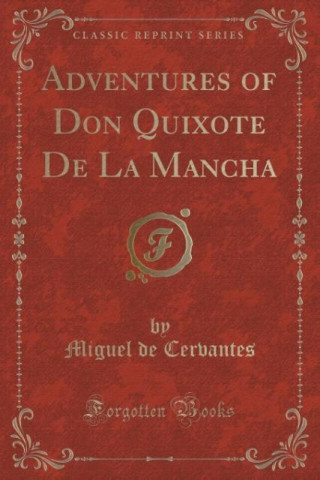
Code: 13933590
Adventures of Don Quixote De La Mancha (Classic Reprint)
by Miguel De Cervantes
Excerpt from Adventures of Don Quixote De La Mancha In 1613 he published his twelve Novelas Exemplares, or Exemplary Novels, with a dedication to his\ patron the Count de Lemos. He called them exemplary, because, as he tells us ... more
- Language:
 English
English - Binding: Paperback
- Number of pages: 608
Publisher: Forgotten Books, 2016
- More about this

You might also like
-

I Had Trouble in Getting to Solla Sollew
36.78 zł -

Journey from Eden
172.16 zł -
![Whose Wife? [A Novel.] Whose Wife? [A Novel.]](https://media.libris.to/jacket/08069127t.jpg)
Whose Wife? [A Novel.]
143.24 zł -5 % -

EU Chemicals Regulation - New Governance, Hybridity and REACH
538.20 zł -10 % -

Discussions with Teachers
89.10 zł -1 %
Availability alert
Enter your e-mail address and once book will be available,
we will send you a message. It's that simple.
More about Adventures of Don Quixote De La Mancha (Classic Reprint)
 Book synopsis
Book synopsis
Excerpt from Adventures of Don Quixote De La Mancha In 1613 he published his twelve Novelas Exemplares, or Exemplary Novels, with a dedication to his\ patron the Count de Lemos. He called them exemplary, because, as he tells us, his other novels had been censured as more satirical than exemplary; which fault he determined to amend in these and therefore each of them contains interwoven in it some error to be avoided, or some virtue to be practised. He asserts that they were entirely his own invention, not borrowed or copied from any other works of the same sort, nor translated from any other language, as was the case with most of the novels which his countrymen had published hitherto. But, notwithstanding this, we cannot fail to remark a strong resemblance in them to the tales of Boccaccio; still they are most excellent in their way, and have always been favourites with the Spanish youth for their interest and pure morality, and their ease and manliness of style. The titles of these novels are, The Little Gipsy, The Generous Lover, Rinconete and Cortadillo, The Spanish English Lady, The Glass Doctor, The Force of Blood, The Jealous Estremadura, The Illustrious servant-maid, The Two Damsels, The Lady Cornelia Bentivoglio, The Deceitful Marriage, and The Dialogue of the Dogs. They have all been translated into English, and are probably not unknown to some of our readers. The next year Cervantes published another small work, entitled the Viage dc Pamasso, or A Journey to Parnassus, which is a playful satire upon the Spanish poets, after the manner of Caesar Caporali's upon the Italian poets under a similar title. It is a good picture of the Spanish literature of his day, and one of the most powerful of his poetical works. It is full of satire, though not ill natured, and there was no man of genius of the time who would complain of being too harshly treated in it. Cervantes introduces himself as the oldest and poorest of all the poetical fraternity, the naked Adam of Spanish poets. The plot of the poem is as follows Apollo wishes to rid Parnassus of the bad poets, and to that end he calls together all the others by a message through Mercury. When all are assembled, he leads them into a rich garden of Parnassus, and assigns to each the place which corresponds to his merits. Poor Cervantes alone does not obtain this distinction, and remains without being noticed in the presence of the rest, before whom all the works he has ever published are displayed. In vain does he urge his love for literature, and the troubles which he had endured for its sake; no seat can he get. At last Apollo, in compassion upon him, advises him to fold up his cloak, and to make that his seat; but, alas, so poor is he that he does not possess such a thing, and so he is obliged to remain standing, in spite of his age, his talents, and the opinion of many who know and confess the honour and position which are his due. The vessel in which this Journey to Parnassus is performed is described in a way quite worthy of Cervantes From topmast to keel it was all of verse 3 not one foot of prose was there in it. The airy railings which fenced the deck were all of double-rhymes. Ballads, an impudent but necessary race, occupied the rowing benches; and rightly, for there is nothing to which they may not be turned. The poop was grand and gay, but somewhat strange in its style, being stuck all over with sonnets of the richest workmanship. The stroke-oars on either side were pulled by two vigorous triplets, which regulated the motion of the vessel in a way both easy and powerful. The gangway was one long and most melancholy elegy, from which tears were continually dropping. About the Publisher Forgotten Books publishes hundreds of thousands of rare and classic books. Find more at www.forgottenbooks.com
 Book details
Book details
Book category Books in English Fiction & related items Adventure
- Full title: Adventures of Don Quixote De La Mancha (Classic Reprint)
- Author: Miguel De Cervantes
- Language:
 English
English - Binding: Paperback
- Number of pages: 608
- EAN: 9781333247355
- ISBN: 1333247354
- ID: 13933590
- Publisher: Forgotten Books
- Weight: 803 g
- Dimensions: 229 × 152 × 32 mm
- Date of publishing: 16. August 2016
Trending among others
-

Long Way to a Small, Angry Planet
48.98 zł -14 % -

Final Fantasy VII: On the Way to a Smile
61.68 zł -5 % -

All Systems Red
68.34 zł -12 % -

Rogue Protocol
79.32 zł -13 % -

God Country
69.95 zł -10 % -

Finale
92.93 zł -

Fire and Blood
33.66 zł -23 % -

God of War - The Official Novelization
42.93 zł -23 % -

Is It Wrong to Try to Pick Up Girls in a Dungeon?, Vol. 12 (light novel)
61.68 zł -5 % -

Closed and Common Orbit
37.79 zł -26 % -

Is It Wrong to Try to Pick Up Girls in a Dungeon? Familia Chronicle, Volume 1 (light novel)
59.57 zł -5 % -

re:Zero Starting Life in Another World, Vol. 8 (light novel)
64.20 zł -1 % -

Overlord, Vol. 8 (Light Novel)
84.87 zł -6 % -

Sword Art Online Progressive, Vol. 5 (light novel)
61.28 zł -7 % -

Beyond Redemption
56.64 zł -23 % -

Hunt for Red October
141.72 zł -4 % -

End
94.14 zł -1 % -

Tom Clancy's the Division: Broken Dawn
45.55 zł -6 % -

Assassin's Creed Valhalla: Geirmund's Saga
47.27 zł -14 % -

Black Corsair
89.10 zł -

DC Comics novels - Harley Quinn: Mad Love
43.44 zł -15 % -

Sword Art Online, Vol. 14 (light novel)
56.64 zł -23 % -

Prophecy Con
40.92 zł -26 % -

Tale of Hodja Nasreddin
79.53 zł -

Palace Job
40.92 zł -26 % -

Sandokan
89.10 zł -

Sandokan
89.10 zł -

Sandokan
89.10 zł -

Fathom: Dawn Of War Vol.1 (Third Printing)
50.19 zł -

Swords in the Mist
76.80 zł -1 % -

Illidan: World of Warcraft
39 zł -13 % -

Uncharted - The Fourth Labyrinth
38.30 zł -23 % -

Marvel's SPIDER-MAN: Hostile Takeover
45.66 zł -5 % -

WorldEnd, Vol. 1
61.78 zł -5 % -

WorldEnd, Vol. 2
61.78 zł -5 % -

Origin
38.30 zł -23 % -

STARGATE ATLANTIS The Lost (Legacy book 2) ( Sga #17 )
85.17 zł -

WarCraft: War of The Ancients Book one
57.75 zł -14 % -

Shadow of the Tomb Raider - Path of the Apocalypse
40.01 zł -15 % -

Diablo: Legacy of Blood
65.11 zł -6 % -

Autumn Republic
52.01 zł -23 % -

Minecraft: The Island
43.44 zł -15 % -

Celestine Prophecy
75.60 zł -13 % -

Tom Clancy's Shadow of the Dragon
36.58 zł -14 % -

Nemesis Games
118.74 zł -10 % -

Tom Clancy's Firing Point
40.01 zł -15 % -

Fire and Blood
114.41 zł -15 % -

Civil War
47.37 zł -11 % -

Sea of Greed
45.35 zł -9 %
safisfied customers
Since 2008, we have served long line of book lovers, but each of them was always on the first place.
Copyright! ©2008-24 libristo.pl All rights reservedPrivacyPoučení o cookies



 21 million books
21 million books Delivery 12.99 zł
Delivery 12.99 zł (32) 444 93 66 (8-15.30h)
(32) 444 93 66 (8-15.30h)